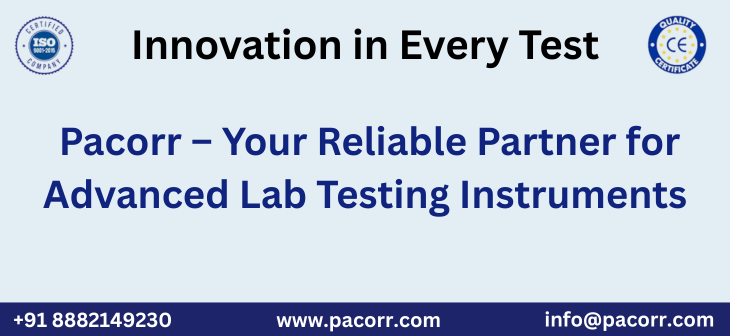
Pacorr has long stood at the forefront of material testing equipment innovation, delivering precision-engineered solutions for industries where quality control is paramount. Among its range of sophisticated testing instruments, Pacorr offers robust and reliable solutions for performing tensile tests on rigid plastics, specifically conforming to the ASTM D638 standard. This critical test method plays a significant role in ensuring the structural integrity and performance reliability of plastic materials used in various sectors, from automotive to packaging.
As industries increasingly rely on high-performance polymers, understanding how these materials behave under tension becomes essential. Pacorr's advanced tensile testing machines are designed not only to meet but exceed the expectations set by ASTM D638, providing manufacturers with the confidence that their materials will hold up under stress.
Understanding the ASTM D638 Standard for Rigid Plastics
The ASTM D638 test method is a globally recognized standard that specifies the procedure for determining the tensile properties of unreinforced and reinforced rigid plastics. The test evaluates characteristics such as tensile strength, elongation at break, and modulus of elasticity. These properties are vital for predicting how a plastic component will perform under mechanical stress.
In this test, a plastic specimen is shaped into a standardized dumbbell profile and pulled at a constant rate of extension until it breaks. The force applied and the corresponding elongation are recorded throughout the process. This data helps in calculating essential mechanical properties that guide material selection and design in engineering applications.
Why Tensile Testing is Critical for Plastic Manufacturing
Tensile testing is not just a regulatory requirement. It serves as a foundation for material innovation and application. For plastic manufacturers, particularly those dealing with rigid materials like polycarbonate, polystyrene, or PVC, understanding the tensile properties can mean the difference between product success and failure in the field.
Pacorr’s tensile testing machines for plastics are equipped with digital controls, high-accuracy load cells, and intuitive software interfaces that allow for real-time monitoring and data capture. These features make them indispensable in R&D labs, production floors, and quality assurance departments.
By utilizing Pacorr’s testing solutions, manufacturers gain detailed insights into the strength and flexibility of their plastic products. This, in turn, enables precise adjustments in composition and processing to meet exacting application needs, such as impact resistance, dimensional stability, or load-bearing capacity.
Pacorr’s Advanced Testing Machines: Designed for Precision and Compliance
When performing tensile tests according to ASTM D638, the accuracy and consistency of results depend heavily on the capabilities of the testing equipment. Pacorr has engineered its tensile testing instruments to align with international standards while incorporating features that make the testing process efficient and repeatable.
Key features of Pacorr's tensile testing equipment include:
- High-resolution load indicators for exact force measurements
- Variable speed settings for customizable test parameters
- Ergonomically designed specimen grips to prevent slippage
- Software integration for automated reporting and data analysis
- Rigid frame construction to minimize deflection during high-load testing
These features ensure that every tensile test conducted on Pacorr machines delivers data that is both reproducible and reliable—key requirements in quality-critical manufacturing environments.
Tensile Test Procedure: Step-by-Step Breakdown
Performing a tensile test on rigid plastic using the ASTM D638 method involves several standardized steps. Below is an overview of the typical procedure:
- Sample Preparation: Specimens are precisely machined into a dumbbell shape with specified dimensions according to the type of plastic and thickness. Pacorr offers compatible specimen preparation tools to ensure dimensional accuracy.
- Machine Setup: The specimen is clamped into the grips of the testing machine. Pacorr’s machines are designed for easy alignment, reducing operator error.
- Test Execution: The machine applies a uniaxial tensile load at a controlled rate. Sensors continuously record the applied force and elongation.
- Data Analysis: Results such as ultimate tensile strength, yield strength, elongation at break, and Young’s modulus are calculated and plotted for evaluation.
- Reporting: Pacorr’s integrated software allows for automatic generation of test reports in formats suitable for internal quality systems or external audits.
Applications of ASTM D638 Tensile Test Across Industries
The ASTM D638 tensile test is employed across multiple industries, each with its own set of compliance needs and performance expectations. Pacorr’s testing machines serve manufacturers in the following sectors:
- Automotive: For testing dashboard components, housings, and bumpers
- Construction: Evaluating rigid pipe strength and plastic panels
- Consumer Goods: Assessing strength of plastic casings and containers
- Aerospace: Verifying the load-bearing capability of non-metallic internal parts
- Medical Devices: Ensuring safety of polymer-based medical enclosures
Each application area relies on precise tensile property data to ensure that materials meet performance and safety benchmarks. With Pacorr’s equipment, companies can streamline their testing workflows while ensuring full adherence to ASTM D638.
Experience and Expertise Behind Pacorr’s Innovation
What sets Pacorr apart in the competitive landscape of material testing solutions is its dedication to engineering excellence and continuous innovation. With years of experience and a deep understanding of polymer behavior, the team at Pacorr consistently develops solutions that meet evolving industrial needs.
Their tensile testing machines are not off-the-shelf products. Each unit is the result of meticulous design, extensive field feedback, and performance tuning. This commitment to quality and technical depth reinforces Pacorr’s position as an industry leader in testing solutions for rigid plastics.
Why Trust Pacorr for Your Tensile Testing Needs
Trust is not built overnight. It comes from a consistent track record of reliability, accuracy, and customer satisfaction. Pacorr’s testing machines are not only manufactured to meet international quality standards, but they are also supported by an expert team that provides installation, training, and ongoing technical support.
Whether you are testing newly formulated polymers or conducting routine batch verification, Pacorr ensures that your tensile testing process is smooth, compliant, and informative. Their equipment empowers manufacturers to meet global benchmarks, reduce failures, and optimize material performance.
Conclusion: Enhancing Quality Through Accurate Testing
In a world where materials are continuously pushed to perform under extreme conditions, tensile testing becomes a non-negotiable quality gate. Pacorr’s commitment to delivering reliable, user-friendly, and standard-compliant tensile testing machines has made them a trusted name in the industry.
By adhering to ASTM D638 guidelines and leveraging Pacorr’s precision equipment, manufacturers can significantly enhance their product reliability, ensure regulatory compliance, and gain a competitive edge. Choosing Pacorr is not just about buying a machine; it is about investing in precision, expertise, and lasting value.
Thanks to Pacorr Testing instruments, we have all the required quality testing instruments that have helped us to ensure the best quality delivered to our clients.

Danish
Fair Exports Pvt. Ltd.

